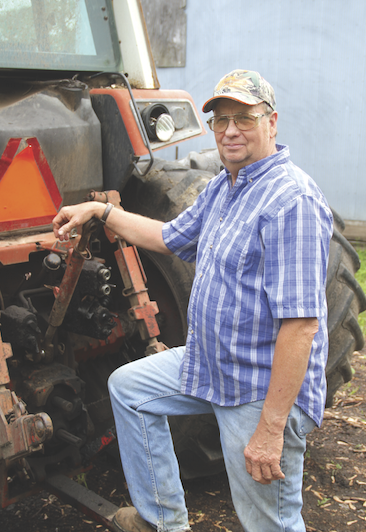
Free Screening, Priceless Outcome
By: Madison Burke
Ron Gladbach was careful. As a longtime farmer and someone with a family history of skin cancer, he knew he was at high risk. He often checked his skin for signs of cancer, focusing on areas frequently exposed to the sun, like his face and ears.
“My dad had skin cancer on his ears, so I was always sure to check there,” Ron says.
But when he received a free skin cancer screening from Boone Hospital’s Know Your Numbers mobile health unit, Ron was surprised when his nurse, Pam Jones, flagged a small pink mark on his chest.
“I thought, ‘Oh, that might not be good,’” Ron says.
Pam recommended Ron see a dermatologist, and he scheduled an appointment immediately.
“The doctor asked if I spent a lot of time outside without a shirt in my teens. I said yes, and he told me now I’m paying the price,” Ron says.
After a biopsy, Ron was diagnosed with basal cell carcinoma, a form of skin cancer. Ron had surgery to remove the cancer the following month and is now in good health. He says he never would have known he had cancer if not for that screening.
“There’s no other free screenings around here that offer such a thorough exam,” Ron says.
Ron is from Mendon, a small town about 90 miles northwest of Columbia. He received his skin cancer screening in the nearby town of Keytesville this past August.
“I was just tickled that we had a screening close enough that we could catch it — and thank goodness we did,” Ron says.
The Know Your Numbers mobile health unit travels to mid-Missouri communities to provide skin cancer screenings and education about being safe in the sun. Thanks to funding by Boone Hospital Foundation, these screenings are offered to community members for free. During a total body skin examination for skin cancer, nurses look for marks, spots, freckles, moles and any skin discolorations that do not appear to be normal.
“Skin cancer is most commonly found on sun-exposed areas, but can occur anywhere, so the entire surface area of the skin should be inspected,” Pam says.
Pam, who is certified in skin cancer screening, says it is best for everyone to get their skin checked for skin cancer by a medical professional once a year, but also encourages giving yourself a self-exam once a month.
“We teach the ABCDE approach when looking at the skin. People should look head to toe at all their marks and spots.” (See box.)
One in five Americans will develop some form of skin cancer in their lifetime and experts say early detection is key.
Lindall Perry, M.D., of Columbia Dermatology says, “Non-melanoma skin cancers are locally destructive and require early detection to minimize tissue loss and surgical scarring at the time of their detection. Melanoma skin cancers can spread throughout the body if left untreated.”
Dr. Perry says staying out of the sun, covering up and wearing sunscreen are effective ways to protect yourself against skin cancer. He says most people only apply 25 to 50 percent of the recommended amount of sunscreen; about a shot glass’s worth of sunscreen is generally needed to cover most of the body.
“Different sunscreens may be better for different body parts,” adds Dr. Perry. He recommends using a cream sunscreen for dry skin and on the face; gels for hairy areas, like the scalp or a male chest; and sticks for around the eyes.
Dr. Perry also advises checking the expiration date on your sunscreen bottle. If your sunscreen is past its prime, toss it and buy a new one.